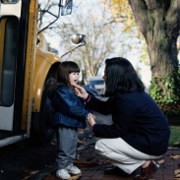 Photo: Getty Images
Photo: Getty Images
Every autumn, children across the country are performing the back-to-school rituals that have been performed for decades. They pack overloaded backpacks with pencils, books, and about hundred other things and hunch their shoulders to carry the heavy load. These students worry about getting into the advance placement classes, whether the extra Spanish sessions in the summer paid off to keep them ahead of the curve, or if their parents made the right connections to make sure they got into the best class in the best school. And no, these aren’t college kids, or highschoolers ... they are kindergartners!
Every year stressed-out students are getting younger and younger so now even the youngest students are sweating the small stuff come school time. In an August, 2011 article, Jamell Andrews, a parenting expert and regular contributor to Parenting Journals concurred that children are feeling more stress. He says, “Especially in this age of increased expectations, rigorous study, and intense competition for educational opportunities, kids are increasingly dealing with stress in addition to all the traditional sources of bad feelings in children. Stress is no longer just a grownup problem. Kids face many of the same pressure that adults do, and they also have pressures of their own.”
These pressures can have real and long-term effects on children, their parents and the family as a whole. In 2010, the American Psychological Association (APA) released their yearly Stress in America study showed that chronic stress could have long-term term impact on emotional and physical health. The study reads: “There also seems to be a troublesome trend emerging among families in which parents are underestimating how much stress their children experience and the impact their own stress has on their children. At the same time, children as young as eight years old are reporting that they experience physical and emotional health consequences often associated with stress.”
Overall, the study found that parents are underestimating the impact their own stress has on their family, which could have far deeper, and more insidious, health implications then they realize. According to the APA study, “More than two-thirds parents of teens and tweens say their stress has slight or no impact on their children, yet only 14 percent of children report that their parent’s stress does not bother them. In addition, one-third of children (34 percent) say they know their parent is worried or stressed out when they yell.”
Ms. Andrews believes that there are some key things parents can do to help their children manage the stress that is bound to come into their lives. She encourages parents to make sure they are being a loving, supporting presence in their children’s lives and make sure they give the kids plenty of play time. She also says, “There are two things that parents should remember. First, some amount of stress is normal, and parents cannot completely shield their children from the pressures of the world. What they can do, however, is make sure their children feel loved and happy despite any difficulties. Second, it is a good idea to plan ahead for any situations that may make your child feel stress. By honing your family’s coping skills, you will eventually find a way to soften the blow of the harshest stressors.”
Source: American Pyschological Association “Stress in the US” study: http://www.apa.org/news/press/releases/2010/11/stress-in-america.aspx
Jamell Andrews “A Parent’s Guide to Childhood Stress” http://www.parenting-journals.com/736/a-parents-guide-to-childhood-stress
Edited by Jody Smith





Add a CommentComments
There are no comments yet. Be the first one and get the conversation started!